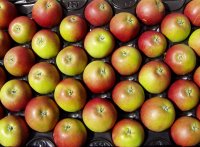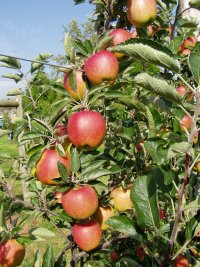

Marketing is a vital and integral part of the mainstream supply of Apples to our UK Supermarkets, where 80% of all Apples are sold, indeed no serious supplier can hope to succeed without fully addressing the influence of the Global Market.
 Fifty years ago when the The English Apple Man was but a mere boy on the family farm, it was quite different. In those far off uncomplicated days when my head was full of other interests, like football, cricket and young ladies, Marketing as I remember it, was a far more relaxed affair. In those post war years, with no demanding Supermarkets to pay homage to, when a lot of the English Apple crop arrived in the wholesale markets of London and other city markets, pretty much as it had been picked off the tree, 'jumbled' in returnable 40lb wooden boxes, Father, along with other more progressive growers had set out his own high standards. He recognised the value of his crop would be significantly enhanced by grading diligently into separate classes.
Fifty years ago when the The English Apple Man was but a mere boy on the family farm, it was quite different. In those far off uncomplicated days when my head was full of other interests, like football, cricket and young ladies, Marketing as I remember it, was a far more relaxed affair. In those post war years, with no demanding Supermarkets to pay homage to, when a lot of the English Apple crop arrived in the wholesale markets of London and other city markets, pretty much as it had been picked off the tree, 'jumbled' in returnable 40lb wooden boxes, Father, along with other more progressive growers had set out his own high standards. He recognised the value of his crop would be significantly enhanced by grading diligently into separate classes.
Back then, unlike today, when no statutory classes existed, he graded Apples into 5 separate classes. The highest quality, 'Extra Class' had only the very best fruit with each apple individually wrapped, these wraps carried our distinctive emblem; or a logo as it would be branded today; the significant aspect of this design was a pheasant in flight in the centre of a circle with our name and address, thus linking the present with our past when Grandfather established the farm as a Game Farm in 1921. These Extra Class Apples were marketed in a cardboard chip, holding approximately 12lb of fruit and packing these 'high value' packs was the preserve in the 1950's of my mother, and only the most trusted of packers. The designated 1st Class apples were layer packed into 20lb returnable market boxes and 'lidded' with our Pheasant design in red; signifying first class; second class had a blue lid and third class a green lid. Such was the demand for English Apples in those days that in most seasons a lower class with a plain white lid, labelled 'Domestic' complemented our range.
Coming back to the notion of 'Marketing' most of our apples were sold in the wholesale markets of Covent Garden by G.T.Wooderson; George, whose brother Sydney Wooderson was the great English athlete of the post war period, or E.C. Dean in Brentford; 'Percy Dean' was a very personable man and his dedication to selling good quality produce was in sync with father's high principles. Such was the demand for father's 'quality' apples that the lorry drivers always tried to load our fruit at the front of the lorry, as the sellers in the market were often only interested in our consignment and this was the lorry drivers solution to receiving help and getting all the fruit off the lorry quickly. If our fruit was on the back, they grabbed that and left poor Mr. Lorry Driver to his own devices.
 I am not sure this is really Marketing, but in those far of halcyon days I remember well the 'Christmas Hampers' we received from George and Percy, full of nice things; George always included a case of two fresh Pineapples; funny how these things stick in the memory!
I am not sure this is really Marketing, but in those far of halcyon days I remember well the 'Christmas Hampers' we received from George and Percy, full of nice things; George always included a case of two fresh Pineapples; funny how these things stick in the memory!
So on to today's world! Marketing Apples, indeed fruit in general, has evolved to such a degree that it is almost impossible for a marketing group to succeed by only selling English Apples; driven by the sophisticated and demanding Supermarket it is necessary for any marketeer to trade 365 days of the year; long gone are the days when we English Growers could 'ring our customer' and gently remind them 'that our English Apple season' was under way again. This all year supply of course necessitates marketing Imported as well as English Apples; the season for English starts in August and finishes in late March, apart from our Bramley Cooking Apple which with the benefit of modern storage systems is available all year round.
 At no time in the calendar year do English Apples have exclusivity, even within our season a high proportion of fruit is imported with no more than 30% grown in England. Popular varieties like Braeburn and Gala are truly 'Global' apples and arrive from all continents at some stage of the season; to maximise the sale of English Gala for example, our fruit must equal the quality of imported; appearance is important, but eating quality is paramount and regular tastings will take place with customer technologists to ensure quality is maintained;English Gala is a very successful Apple and customers are very supportive, but in this highly competitive marketplace suppliers who only deal in imported fruit are constantly 'knocking on the door' seeking an opportunity to win the supply from the English Grower. It is common place to agree a sales programme in the spring time; long before the season's weather has determined the size and quality of our English Apple crop; The Marketeer has to estimate the probable volumes available for each variety, not just for the season, but weekly, and failure to fulfill this programme can result in loss of the business.
At no time in the calendar year do English Apples have exclusivity, even within our season a high proportion of fruit is imported with no more than 30% grown in England. Popular varieties like Braeburn and Gala are truly 'Global' apples and arrive from all continents at some stage of the season; to maximise the sale of English Gala for example, our fruit must equal the quality of imported; appearance is important, but eating quality is paramount and regular tastings will take place with customer technologists to ensure quality is maintained;English Gala is a very successful Apple and customers are very supportive, but in this highly competitive marketplace suppliers who only deal in imported fruit are constantly 'knocking on the door' seeking an opportunity to win the supply from the English Grower. It is common place to agree a sales programme in the spring time; long before the season's weather has determined the size and quality of our English Apple crop; The Marketeer has to estimate the probable volumes available for each variety, not just for the season, but weekly, and failure to fulfill this programme can result in loss of the business.
Our World is now governed by 'Category Management' a concept started in the USA and now fully integral to our business. The 'lucky' marketeer chosen by the customer, has the responsibility for Managing a specific category, while this benefits the customer, The Supermarket with one selling desk to deal with, it also enables the marketeer control of the category; for example Apples.
 The Marketeer is responsible for pretty much everything, from source to supermarket and supplying up to date market research; the customer, not to be confused with the consumer, 'ticks the box' if all is as planned and 'kicks ass' if not. There are considerable benefits on each side, but also high risks, as the customer can change category managers with disastrous consequences for the supplier. In theory this only happens if the supplier fails in the expectations of the customer, but the power is very much one sided. It has and will continue to happen, leaving some suppliers in a bankrupt position if they are too dependent on one customer.
The Marketeer is responsible for pretty much everything, from source to supermarket and supplying up to date market research; the customer, not to be confused with the consumer, 'ticks the box' if all is as planned and 'kicks ass' if not. There are considerable benefits on each side, but also high risks, as the customer can change category managers with disastrous consequences for the supplier. In theory this only happens if the supplier fails in the expectations of the customer, but the power is very much one sided. It has and will continue to happen, leaving some suppliers in a bankrupt position if they are too dependent on one customer.
While this seems unfair it is no different to supplying other commodities, a sign of the 'highly competitive Global Market influence on our life today. Succeed or suffer the consequences!